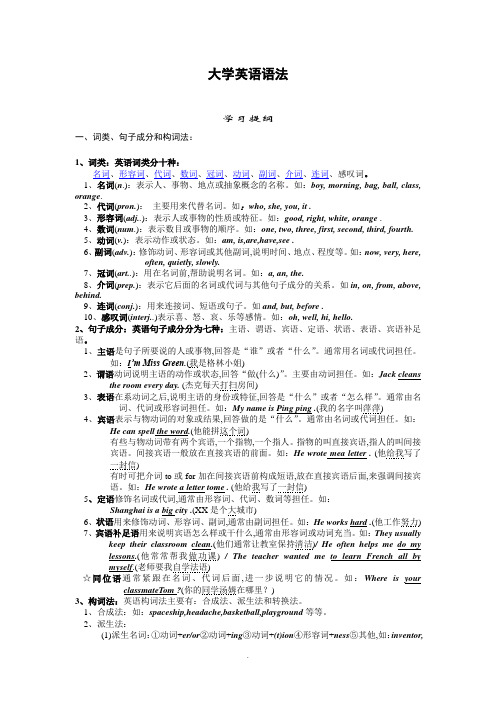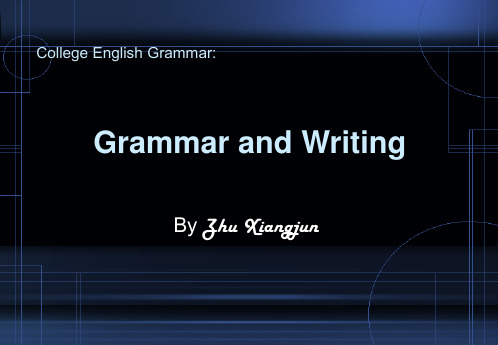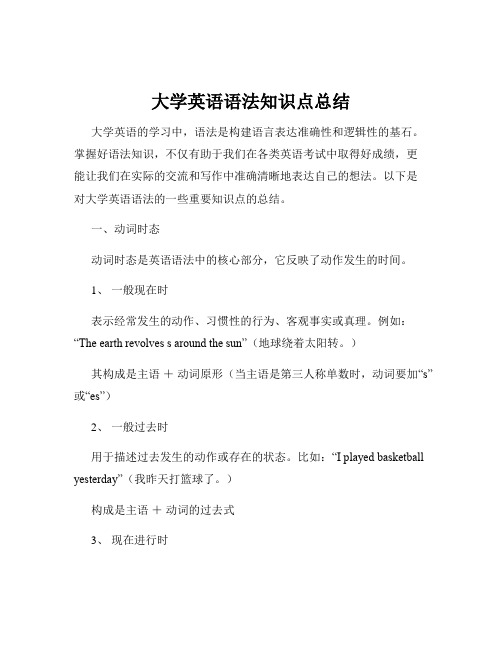英语语法+大学英语语法总结(2)
大学英语知识点总结归纳

大学英语知识点总结归纳一、语法知识点1. 英语句子的基本构成英语句子的基本构成包括主语、谓语、宾语等,根据不同的语法成分可以分为简单句、并列句、复合句等多种形式。
掌握句子的基本构成对于语言的准确表达和理解至关重要。
2. 时态英语中的时态包括一般现在时、一般过去时、一般将来时、现在进行时、过去进行时、现在完成时、过去完成时等。
时态的正确使用可以使语言表达准确清晰。
3. 语态英语中的语态包括主动语态和被动语态,正确使用语态可以使表达更加灵活多样。
4. 语气英语中的语气包括陈述语气、疑问语气、祈使语气等,每种语气的使用都有其特定的情境和表达方式。
5. 并列连词和从属连词并列连词用于连接并列结构的词、短语、从句等,包括and、or、but等;从属连词用于连接主从复合句,包括because、when、although等。
6. 形容词和副词的比较级和最高级形容词和副词的比较级和最高级形式可以用于比较不同事物的程度和大小。
7. 定冠词和不定冠词定冠词包括the,不定冠词包括a和an,使用时需要根据名词的情境和特点正确选择。
8. 代词代词分为人称代词、物主代词、反身代词、指示代词等,根据情境需要选择正确的代词形式。
9. 主谓一致主谓一致是指主语和谓语在人称和数上保持一致,是英语句子中的重要语法规则。
10. 介词介词用于连接名词、代词、动词或形容词等,构成介词短语用于修饰其他成分,掌握介词的使用可以使语言表达更加丰富。
二、词汇知识点1. 单词的拼写和发音掌握英语单词的拼写和发音是学习英语的基本功,有助于提高语言表达的准确性。
2. 同义词和反义词同义词和反义词可以丰富语言表达的方式,帮助学习者避免重复使用相同的词汇。
3. 词汇搭配词汇搭配是指在语言表达中,词语之间常常有固定的搭配关系,如动词搭配介词、名词搭配形容词等,掌握词汇搭配可以使表达更加自然流畅。
4. 词义辨析英语中存在大量近义词和异义词,学习者需要掌握它们的区别和正确用法,避免混淆。
大学英语语法总结(全面)

大学英语语法总结(全面)大学英语语法总结(全面完整版)1. 介词(Prepositions)- 表示地点:at, in, on- 表示时间:at, in, on- 表示方式:by, with- 表示原因:because of, due to- 表示目的:for, to2. 冠词(Articles)- 定冠词:the- 不定冠词:a, an3. 代词(Pronouns)- 主格代词:I, you, he, she, it, we, they- 宾格代词:me, you, him, her, it, us, them- 所有格代词:my, your, his, her, its, our, their- 反身代词:myself, yourself, himself, herself, itself, ourselves, themselves4. 名词(Nouns)- 单数名词:book, chair, dog- 复数名词:books, chairs, dogs- 不可数名词:water, money, information5. 动词(Verbs)- 一般现在时:I walk, you walk, he/she/it walks, we walk, they walk- 一般过去时:I walked, you walked, he/she/it walked, we walked, they walked- 现在进行时:I am walking, you are walking, he/she/it is walking, we are walking, they are walking- 过去进行时:I was walking, you were walking, he/she/it was walking, we were walking, they were walking- 一般将来时:I will walk, you will walk, he/she/it will walk, we will walk, they will walk6. 形容词(Adjectives)- 描述名词特征:big, small, tall- 比较级:bigger, smaller, taller- 最高级:biggest, smallest, tallest7. 副词(Adverbs)- 表示方式:quickly, slowly- 表示程度:very, extremely- 表示时间:now, yesterday8. 连词(Conjunctions)- 表并列:and, or- 表递进:furthermore, moreover- 表转折:however, but- 表原因:because, since以上是大学英语语法的简要总结,希望对你有帮助。
大学英语语法大全(最新整理)

大学英语语法学习提纲一、词类、句子成分和构词法:1、词类:英语词类分十种:名词、形容词、代词、数词、冠词、动词、副词、介词、连词、感叹词。
1、名词(n.):表示人、事物、地点或抽象概念的名称。
如:boy, morning, bag, ball, class, orange.2、代词(pron.):主要用来代替名词。
如:who, she, you, it .3、形容词(adj..):表示人或事物的性质或特征。
如:good, right, white, orange .4、数词(num.):表示数目或事物的顺序。
如:one, two, three, first, second, third, fourth.5、动词(v.):表示动作或状态。
如:am, is,are,have,see .6、副词(adv.):修饰动词、形容词或其他副词,说明时间、地点、程度等。
如:now, very, here,often, quietly, slowly.7、冠词(art..):用在名词前,帮助说明名词。
如:a, an, the.8、介词(prep.):表示它后面的名词或代词与其他句子成分的关系。
如in, on, from, above, behind.9、连词(conj.):用来连接词、短语或句子。
如and, but, before .10、感叹词(interj..)表示喜、怒、哀、乐等感情。
如:oh, well, hi, hello.2、句子成分:英语句子成分分为七种:主语、谓语、宾语、定语、状语、表语、宾语补足语。
1、主语是句子所要说的人或事物,回答是“谁”或者“什么”。
通常用名词或代词担任。
如:I’m Miss Green.(我是格林小姐)2、谓语动词说明主语的动作或状态,回答“做(什么)”。
主要由动词担任。
如:Jack cleansthe room every day. (杰克每天打扫房间)3、表语在系动词之后,说明主语的身份或特征,回答是“什么”或者“怎么样”。
专升本英语语法与词汇知识点总结

专升本英语语法与词汇知识点总结在专升本的英语考试中,语法和词汇是两个至关重要的部分。
掌握好这两方面的知识,对于提升英语成绩和语言运用能力有着举足轻重的作用。
下面,我将为大家详细总结专升本英语中常见的语法和词汇知识点。
一、语法知识点(一)动词时态1、一般现在时表示经常发生的动作、存在的状态或客观真理。
其构成是主语+动词原形(当主语是第三人称单数时,动词要加“s”或“es”)。
例如:“He often goes to school by bike”2、一般过去时表示过去发生的动作或存在的状态。
构成是主语+动词的过去式。
如:“I played basketball yesterday”3、现在进行时表示正在进行的动作。
其结构是“主语+ be 动词+动词的现在分词”。
比如:“They are watching TV now”4、过去进行时强调过去某个时间正在进行的动作,形式为“主语+ was/were +动词的现在分词”。
像:“I was reading a book at that time”5、现在完成时表示过去发生的动作对现在造成的影响或结果,或者从过去开始一直持续到现在的动作。
其构成是“主语+ have/has +过去分词”。
例如:“She has learned English for five years”6、过去完成时表示过去某个时间之前已经完成的动作,结构是“主语+ had +过去分词”。
比如:“By the end of last year, we had learned 2000 words”(二)语态1、主动语态主语是动作的执行者。
例如:“He opened the door”2、被动语态主语是动作的承受者,构成是“be +过去分词”。
如:“The door was opened by him”(三)非谓语动词1、动词不定式具有名词、形容词和副词的特征,可作主语、宾语、定语、状语等。
大学英语语法2——宾语补语

1. The man handed a photo of a girl. The photo was to me. He did that silently. The man was old. The girl was pretty.
• The old man caught a big fish. • Her husband frequently beat her. • My uncle eventually gave up smoking.
Sometimes action verbs have two different objects: direct object and indirect object. Direct object is the receiver of the action while an indirect object is the receiver of the direct object. For instance:
or other nominal as the subject of the sentence and an intransitive verb or verb phrase as the predicate. • Dead dog don’t bite. • Money talks.
Structure 2: S-IV-C • The words acting as a predicative may be a prepositional
He proudly became a boss of a book-store for the first time in his life.
大学英语语法知识点总结

大学英语语法知识点总结大学英语的学习中,语法是构建语言表达准确性和逻辑性的基石。
掌握好语法知识,不仅有助于我们在各类英语考试中取得好成绩,更能让我们在实际的交流和写作中准确清晰地表达自己的想法。
以下是对大学英语语法的一些重要知识点的总结。
一、动词时态动词时态是英语语法中的核心部分,它反映了动作发生的时间。
1、一般现在时表示经常发生的动作、习惯性的行为、客观事实或真理。
例如:“The earth revolves s around the sun”(地球绕着太阳转。
)其构成是主语+动词原形(当主语是第三人称单数时,动词要加“s”或“es”)2、一般过去时用于描述过去发生的动作或存在的状态。
比如:“I played basketball yesterday”(我昨天打篮球了。
)构成是主语+动词的过去式3、现在进行时表示正在进行的动作。
像:“He is reading a book now”(他正在读书。
)结构为:主语+ be 动词(am/is/are)+动词的现在分词4、过去进行时强调过去某个时刻正在进行的动作。
例如:“I was doing myho mework at 8 o'clock last night”(昨晚八点我正在做作业。
)其形式为:主语+ was/were +动词的现在分词5、现在完成时表示过去发生的动作对现在造成的影响或结果,或者过去的动作一直持续到现在。
例如:“I have finished my work”(我已经完成了工作。
)由“主语+ have/has +动词的过去分词”构成6、过去完成时表示过去某一时间或动作之前已经发生或完成的动作。
例如:“By the end of last year, I had learned 5000 words”(到去年年底,我已经学了5000 个单词。
)结构为:主语+ had +动词的过去分词7、一般将来时用以表达将来要发生的动作或存在的状态。
大学英语语法结构分析知识点汇总

大学英语语法结构分析知识点汇总大学英语的学习中,语法结构的掌握至关重要。
它不仅是理解英语句子和文章的基础,也是正确表达自己思想的关键。
以下为大家汇总了一些重要的大学英语语法结构分析知识点。
一、句子成分句子成分包括主语、谓语、宾语、定语、状语和补语。
主语通常是句子所描述的主体,一般是名词、代词或相当于名词的短语或从句。
例如:“The book is interesting”(这本书很有趣。
)中,“The book”就是主语。
谓语则是表示主语动作或状态的部分,通常是动词。
像“ He studies hard”(他学习努力。
)里,“studies”就是谓语。
宾语是动作的对象,常为名词、代词等。
比如“ She loves music”(她喜欢音乐。
)中,“music”就是宾语。
定语用于修饰名词或代词,比如“ The beautiful girl is my sister”(那个漂亮的女孩是我妹妹。
),“beautiful”就是定语。
状语用来修饰动词、形容词、副词或整个句子,说明时间、地点、原因、方式等。
例如“ He runs fast in the park”(他在公园里跑得很快。
),“fast”和“in the park”都是状语。
补语则是对主语或宾语进行补充说明,比如“ The flower smells sweet”(这花闻起来很香。
),“sweet”就是补语。
二、名词性从句名词性从句包括主语从句、宾语从句、表语从句和同位语从句。
主语从句在句子中充当主语,例如:“What he said is true”(他说的是真的。
)宾语从句在句中作宾语,像“ I don't know where he lives”(我不知道他住哪儿。
)表语从句在系动词之后,充当表语,比如“ T he problem is whetherwe can finish it on time”(问题是我们能否按时完成。
)同位语从句用于解释说明前面的名词,例如“ The news that he won the game is exciting”(他赢得比赛的消息令人兴奋。
英语语法知识大全汇总

英语语法知识大全汇总英语的重点主要在词汇,语法、阅读理解、作文……等等,其中语法是让大家一直比较头疼的知识点,下面给大家带来一些关于英语语法知识大全汇总,希望对大家有所帮助。
1.英语语法指的是什么英语语法是针对英语语言进行研究后,系统地总结归纳出来的一系列语言规则。
英语语法的精髓在于掌握语言的使用。
英语语法包括词语、时态、语态、语气、句子成分、句型结构等。
1.一般现在时:表示现在的状态、经常的或习惯性的动作、主语具备的性格和能力等。
基本结构:主语+be/do+其他。
2.一般过去时:表示过去某个时间内(或某一段时间内)发生的动作或存在的状态,过去经常或反复发生的动作。
基本结构:主语+动词的过去式或be的过去式+名词。
3.一般将来时:表示将要发生的动作、打算、计划或准备做某事。
基本结构:主语+am/is/are+going to + do sth;主语+will/shall+do sth4.一般过去将来时:立足于过去某一时刻,从过去看将来,常用于宾语从句中。
基本结构:主语+was/were+going to+do+其它;主语+would/should+do+其它。
5.现在进行时:表示现在(说话时)或当前阶段正在进行或发生的动作。
基本结构:主语+be+doing+其它。
6.过去进行时:表示过去某段时间或某一时刻正在发生或进行的行为或动作。
基本结构:主语+was/were+doing+其它。
7.将来进行时:表示将来某一时间正在进行的动作,或表示要在将来某一时间开始,并继续下去的动作。
常用来表示询问、请求等。
基本结构:主语+shall/will+be+现在分词+其它。
8.过去将来进行时:表示就过去某一时间而言,将来某一时刻或某一段时间正在进行的动作,主要用于宾语从句中,尤其多用于间接引语中。
基本结构:should/would+be+现在分词。
9.现在完成时:过去发生或已经完成的动作对现在造成的影响或结果,或从过去已经开始,持续到现在的动作或状态。
- 1、下载文档前请自行甄别文档内容的完整性,平台不提供额外的编辑、内容补充、找答案等附加服务。
- 2、"仅部分预览"的文档,不可在线预览部分如存在完整性等问题,可反馈申请退款(可完整预览的文档不适用该条件!)。
- 3、如文档侵犯您的权益,请联系客服反馈,我们会尽快为您处理(人工客服工作时间:9:00-18:30)。
关于英语那些你不知道的事都在这里/test/quwen.aspx?tid=16-73675-0二.宾语从句宾语从句就是在复合句中作宾语的名词性从句,通常放在主句谓语动词(及物动词)或介词之后。
1. 作动词的宾语(1) 由that引导的宾语从句(that 通常可以省略),例如:I heard that he joined the army.(2) 由what, whether (if) 引导的宾语从句,例如:1) She did not know what had happened.2) I wonder whether you can change this note for me.(3) 动词+间接宾语+宾语从句。
例如:She told me that she would accept my invitation.2. 作介词的宾语例如:Our success depends upon how well we can cooperate with one another. 3. 作形容词的宾语例如:I am afraid (that) I’ve made a mistake.That 引导的从句常跟在下列形容词后作宾语:Anxious, aware, certain, confident, convinced, determined, glad, proud, surprised,worried, sorry, thankful, ashamed, disappointed, annoyed, pleased, hurt, satisfied, content 等。
也可以将此类词后的that 从句的看作原因状语从句。
4. It 可以作为形式宾语It 不仅可以作为形式主语,还可以作为形式宾语而真正的宾语that 从句则放在句尾,特别是在带复合宾语的句子中。
例如:We heard it that she would get married next month..5. 后边不能直接跟that 从句的动词这类动词有Allow, refuse, let, like, cause, force, admire, condemn, celebrate, dislike, love, help, take, forgive等。
这类词后可以用不定式或动名词作宾语,但不可以用that引导的宾语从句。
例如:I admire their winning the match. (right)I admire that they won the match. (wrong)6. 不可用that从句作直接宾语的动词有些动词不可用于“动词+间接宾语+that从句“结构中,常见的有Envy, order, accuse, refuse, impress, forgive, blame, denounce, advise, congratulate等。
例如:He impressed the manager as an honest man. (right)He impressed the manager that he was an honest man. (wrong)7. 否定的转移若主句谓语动词为Think, consider, wuppose, believe, expect, fancy, guess, imagine等,其后的宾语从句若含有否定意义,一般要把否定词转移到主句谓语上,从句谓语用肯定式。
例如:I don’t think this dress fits you well.(我认为这件衣服不适合你穿。
)三.表语从句表语从句在复合句中作表语的名词性从句,放在系动词之后,一般结构是“主语+连系动词+表语从句”。
可以接表语从句的连系动词有be, look, remain, seem等。
引导表语从句的that常可省略。
另外,常用的还有the reason is that… 和It is because 等结构。
例如:1) The question is whether we can make good preparation in such a short time.2) This is why we can’t get the support of the people3) But the fact remains that we are behind the other classes.4) The reason he is late for school is that he missed the early bus.四.同位语从句同位语从句就是在复合句中作名词的同位语的名词性从句。
1. 同位语从句的功能同位语从句对于名词进一步解释,说明名词的具体内容,一般由that引导,例如:1) The king’s decisio n that the prisoner would be set free surprised all the people.2) The order that all the soldiers should stay still is given by the general.2. 同位语在句子中的位置同位语从句有时可以不紧跟在它所说明的名词后面,而是被别的词隔开。
例如:He got the news from Mary that the sports meeting was put off.3. 同位语从句与定语从句的区别(1) 定语从句中的that既代替先行词,同时以在从句中作某个成分(主语或宾语),而同位语从句中的that是连词,只起连接主句与从句的作用,不充当句中任何成分。
(2) 定语从句是形容词性的,其功能是修饰先行词,对先行词加以限定,描述定的性质或特征;同位语从句是名词性的,其功能是对名词进行补充说明。
例如:1) The news that he told me is that Tom would go abroad next year.(他告诉我的消息是汤姆明年将出国。
)(第一个that引导的从句是定语从句,that在从句中作宾语)2)The news that Tom would go abroad is told by him.(汤姆将出国的消息是他讲的。
)(同位语从句,that在句中不作任何成分五.倒装一般来说,倒装分为全部倒装和部分倒装,有的倒装是因为语法需要而出现的,有的倒装则是因为结构平衡的需要而出现的。
一、全部倒装1. 以here, there,now, then开头的句子,谓语动词要放在句子的主语之前,这种句子中的谓语动词通常是不及物动词。
如:Here comes the train!There goes the bell!注意:如果句子的主语是人称代词,则不能使用倒装结构。
如:Here it comes! / There it does!2. 有些动词短语以副词out, in, up, down, away等结尾,构成不及物动词短语。
这时,为了使句子更形象,常将这些副词提前到句首。
这时,句中的谓语动词要放在句子主语的前面,构成全部倒装。
(注意,这时句子的主语也必须是名词。
如果是人称代词,也不能使用倒装结构。
)如:Up went the rocket.Up it went.3. 为了强调表示地点的介词短语,常将这个介词短语放在句首,构成全部倒装。
注意,这时句子的谓语动词通常是不及物动词。
如:In the front of the lecture hall sat the speaker.4. 表语置于句首,且主语较长或结构较复杂的句子要用全部倒装。
如:Gone are the days when we ha nothing to eat.5. so/ neither/ nor 表示前面所说的情况也适合于后者,其倒装结构为“so/ neither/ nor+助动词/系动词/情态动词”,这里的主语同前一个句子的主语指的是同一人或物。
如:She has finished her homework, so has her brother.She hasn’t gone there, neither/ nor has he.但如果so表示强调,即强调前面所说的情况的真实性时,其结构是“so+主语+助动词/系动词/情态动词”,这里的主语同前一个句子的主语指的是同一人或物。
如:She knows little English, so she does.她英语懂得不多,的确如此。
二、部分倒装1.用于疑问句中。
如:How did you do that?Did you see the film yesterday?2.用于省略if的虚拟条件状语从句中。
如果我们将连词if省略,应把were,had,should 提到主语前面。
如:If you had come yesterday, you would have seen him.---Had you come yesterday, you would have seen him.3.用于as引导的让步状语从句中。
As引导的让步状语从句引起的倒装有以下几种形式:1)副词置于句首。
如:Much as I like it (=Although I like it very much), I will not buy it.2)动词置于句首。
如:Wait as you may (= Although you may wait), he will not see you.3)形容词或名词置于句首。
如:Proud as the nobles are (=Although the nobles are proud), they are afraid to seeme.Child as he is (=Although he is a child), he can tell right from wrong.注意:如果名词前有形容词修饰时,as引导的倒装句中要保留不定冠词。
如:A bad-tempered man as he is (=Although he is a bad-tempered man), he loves me deeply.4.具有否定意义的副词或连词(not, hardly, no sooner, not until, seldom, not once, at no time, never, little等)置于句首时,句子(主句)采用部分倒装。
Little do we know about him.No sooner had he closed his eyes than he fell asleep.Seldom does he come back on Sundays.Not until he came back did I know about it.5.only修饰句子的状语(从句)位于句首时,句子9主句)要用部分倒装。
